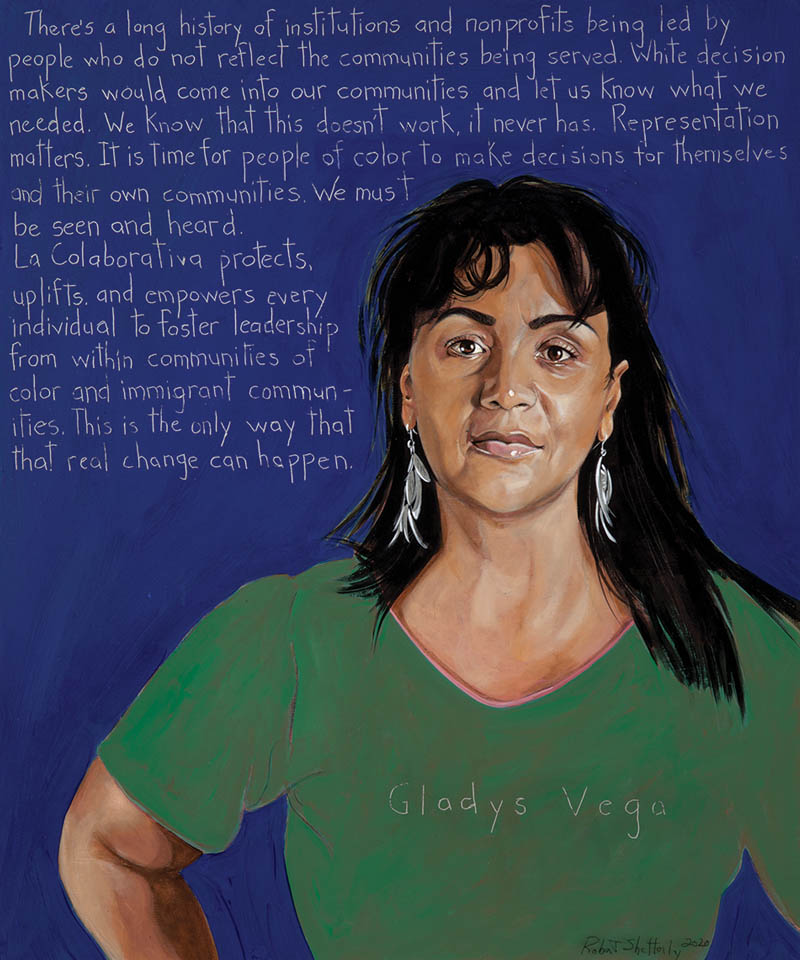
Gladys Vega
Executive Director, La Colaborativa : 1967
“There’s a long history of institutions and nonprofits being led by people who do not reflect the communities being served. White decision makers would come into our communities and let us know what we needed. We know that this doesn’t work, it never has. Representation matters. It is time for people of color to make decisions for themselves and their own communities. We must be seen and heard. La Colaborativa protects, uplifts, and empowers every individual to foster leadership from within communities of color and immigrant communities. This is the only way that real change can happen.”
Biography
Member of the 2011 Class of Barr Fellows
1985-present – member of the team at Chelsea Collaborative
2006-present – Executive Director of La Colaborativa (formerly the Chelsea Collaborative)
Named one of Massachusetts’ 100 most influential leaders (2007, 2008)
Named a “Bostonian of the Year” by the Boston Globe (2020)
At the age of nine, Gladys Vega moved with her family from Puerto Rico to Chelsea, Massachusetts, where she witnessed first-hand the challenges facing Latino residents in the United States. She watched as gentrification displaced residents, economic opportunity bypassed her neighbors, and deportation destroyed families. Using the tools of democracy and human rights—voter registration, economic development, legislative reform, educational opportunity—she determined to bring justice, equality, and opportunity to her community.
In 1990, Vega joined the Chelsea Collaborative, a local non-profit advocating for immigrants’ rights, welfare rights, tenants’ rights, environmental justice, multicultural and anti-racism programs, and other grassroots and national causes. The organization later was renamed La Colaborativa to better reflect its mission. As Office Manager for a two-person organization, she wore many hats, working as receptionist, tenant organizer, and immigrant rights advocate. Vega served in whatever capacity the moment required, fighting for residents’ rights, creating positive connections between law enforcement and residents, and helping Chelsea youths find summer jobs.
Her passion for her work, personable and professional manner, and impeccable community organizing skills helped La Colaborativa score important victories for the community. It also earned Vega the admiration of her colleagues. In 2006, after 16 years as a community organizer, she became the organization’s executive director.
Vega’s tenure as director began with the same tenacity she’d exhibited in her previous position. While navigating the obstacles thrown at her community, she successfully urged the City Council to make Chelsea the third sanctuary city in Massachusetts. She helped found Centro Latino, the only direct service for Latinos in Chelsea at the time. Vega gave her time to the Chelsea Board of Health, United Way Committee, and served as a Democratic delegate for the National Convention in 2000. As architect of most of the Chelsea Collaborative’s initiatives, her reputation as a one of Chelsea’s most prominent and important community leaders grew. In 2007 and 2008, she was named as one of Massachusetts’ one hundred most influential leaders.
Then came COVID-19, and the city’s status as home to a large population of undocumented immigrants took on an entirely new meaning. Living in small, compact housing units served by outdated ventilation systems, Latinos contracted the deadly disease at an alarming rate. The community members’ need to work outside the home further exposed residents in the workplace and on public transportation. Chelsea’s many undocumented immigrants were shut out of the means of assistance, such as health care and stimulus checks.
COVID-19 seemed to stop Chelsea’s promise in its tracks. “The coronavirus in one month has taken five years of progress,” Vega said. “This is a war zone right now.” The virus spread rapidly. Chelsea became the epicenter of one of the hottest areas of infection and at one point claimed the highest per capita number of coronavirus cases in Massachusetts. The city’s difficulty combatting the disease highlighted the disease’s unprecedented impact on underserved communities. Vega and La Colaborativa stepped up to take on the work that the federal, state, and local governments either couldn’t or wouldn’t do.
Tapping into a network of donors cultivated over many years, Vega collected funds and material donations for those suffering. Her office became a pantry where residents could pick up food, diapers, baby formula, and other supplies. The tragedy in Chelsea mobilized donors large and small. A produce collaborative provided fresh food. Local bodegas, uncertain of their own ability to keep their own doors open, gave to the cause. A group of women in Cambridge made regular deliveries to those unable to travel. “A man on Social Security gave me $10,” Vega said. “It’s been the most beautiful show of poor people helping poor people.”
Vega’s work over the years set a model for her neighbors and showed them the power of acting as a community, and while COVID-19 has set Chelsea back, Vega continues efforts to empower her city and ensure that the Latino community assumes the lead in determining its own needs. She believes empowerment of the individual leads to empowerment of the community and that social action is the strongest vehicle a community can use to achieve its goals. By building the leadership skills of its members, they can prepare for and face emerging challenges. At the forefront of her work are images of the people working diligently to strengthen Chelsea and honor it as the ethnically and culturally rich community it is.
Programs
Americans Who Tell the Truth (AWTT) offers a variety of ways to engage with its portraits and portrait subjects. Host an exhibit, use our free lesson plans and educational programs, or engage with a member of the AWTT team or portrait subjects.

Education
AWTT has educational materials and lesson plans that ask students to grapple with truth, justice, and freedom.

Exhibits & Community Engagement
AWTT encourages community engagement programs and exhibits accompanied by public events that stimulate dialogue around citizenship, education, and activism.